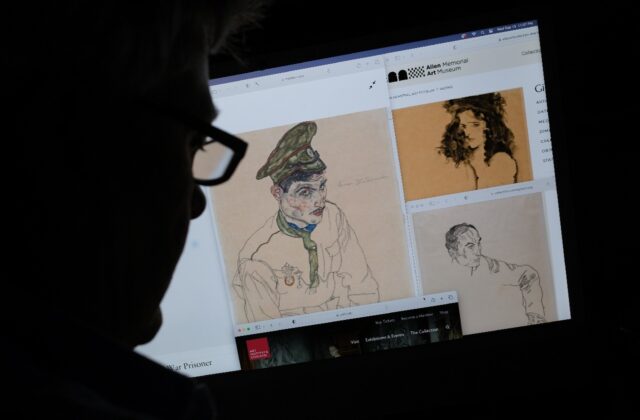US authorities seized three artworks allegedly looted by the Nazis and which are being sought by the heirs of a Jewish art collector who died in the Holocaust, officials said Thursday.
They confirmed a report in The New York Times that said New York investigators had taken these works by the 1900s Austrian expressionist Egon Schiele from three US-based museums.
In warrants issued Tuesday and seen by AFP, the New York state supreme court said “there is reasonable cause to believe” the works constitute stolen property.
The works were seized from the Art Institute of Chicago, the Carnegie Museums of Pittsburgh, and the Allen Memorial Art Museum at Oberlin College in Ohio.
The works in question include “Russian War Prisoner” (1916), a watercolor and pencil on paper piece valued at $1.25 million, seized from the Art Institute, and “Portrait of a Man” (1917), a pencil on paper drawing valued at $1 million and taken from the Carnegie Museums.
“Girl With Black Hair” (1911), a watercolor and pencil on paper work valued at $1.5 million, was seized from Oberlin.
The warrants state that these works can remain where they are for 60 days, and they will be taken to New York at a later date.
“We are confident that Oberlin College legally acquired Egon Schiele’s Girl with Black Hair in 1958, and that we lawfully possess it,” Oberlin said in a statement to AFP. “We are cooperating with the Manhattan District Attorney’s criminal investigation.”
The art pieces are being sought by heirs of Fritz Grunbaum, a prominent Jewish art collector and cabaret artist who died in the Dachau concentration camp in Germany in 1941.
“We are confident in our legal acquisition and lawful possession of this work,” the Art Institute of Chicago said, adding that the piece held there is the subject of a civil case in federal court.
The Carnegie Museums of Pittsburgh pledged to “cooperate fully with inquiries from relevant authorities.”
The Times said the probe underway concerns about a dozen Schiele works allegedly stolen by the Nazis.
Grunbaum’s heirs have been in court for years trying to recover works that belonged to him.
Courts ruled in 2005 that they had waited too long to act.
But in 2016 then-president Barack Obama signed into law the Holocaust Expropriated Art Recovery Act to help recover art misappropriated or looted by the Nazis, and in 2018 Grunbaum’s heirs received a favorable court judgment and recovered two pieces.
The subject remains topical in other countries as well. In France, parliament adopted a framework law in July to facilitate restitution of property looted from Jews under German Nazi rule.
According to statistics released at an international conference in the Czech Republic in 2009, some 100,000 of an estimated 650,000 stolen works have still not been returned.

COMMENTS
Please let us know if you're having issues with commenting.